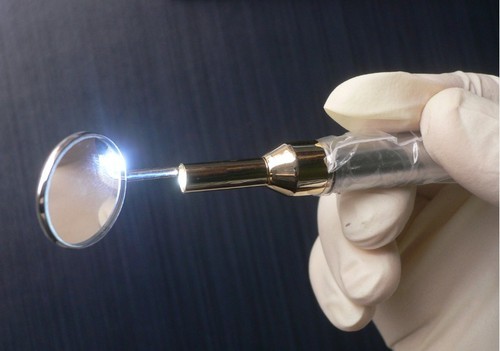Yesterday I posed a scenario where the surgeon needed to see an area of an open abdomen (trauma laparotomy) that could not easily be visualized. Specifically, there was a question as to whether the diaphragm had been violated just anterior to the liver, just under the costal margin.
Short of putting your head in the wound, how can you visualize this area? Or some other hard to reach spot? Well, you could have an assistant insert a retractor and pull like crazy. However, the rib cage might not bend very well, and in elderly patients it may break. Not a good idea.
Some readers suggested breaking out the laparoscopy equipment and using the camera and optics to visualize. This is a reasonable idea, but expensive. Shouldn’t there be some good (and cheap) way to do this?
Of course, and there is. Think low tech. Very low tech. You just need to see around a corner, right. So get a mirror!

Every OR has some sterile dental mirrors lying around. Get one and have your assistant gently hold the liver down while you indirectly examine the diaphragm. Since you’re probably not a dentist, it may take a minute or two to get used to manipulating the mirror to see just what you want. But if you can manage laparoscopic surgery, you’ll get the hang of it quickly.
And if you need more light up in those nooks and crannies? Shine the OR light directly into the abdomen, then place a nice shiny malleable retractor into the area to reflect light into the area in questions. Voila!
Bottom line: A lot of the things that trauma professionals need to do in the heat of the moment will not be found in doctor, nurse, or paramedic books. Be creative. Look at the stuff around you and available to you. Figure out a way to make it work, and make $#!+ up if necessary.

